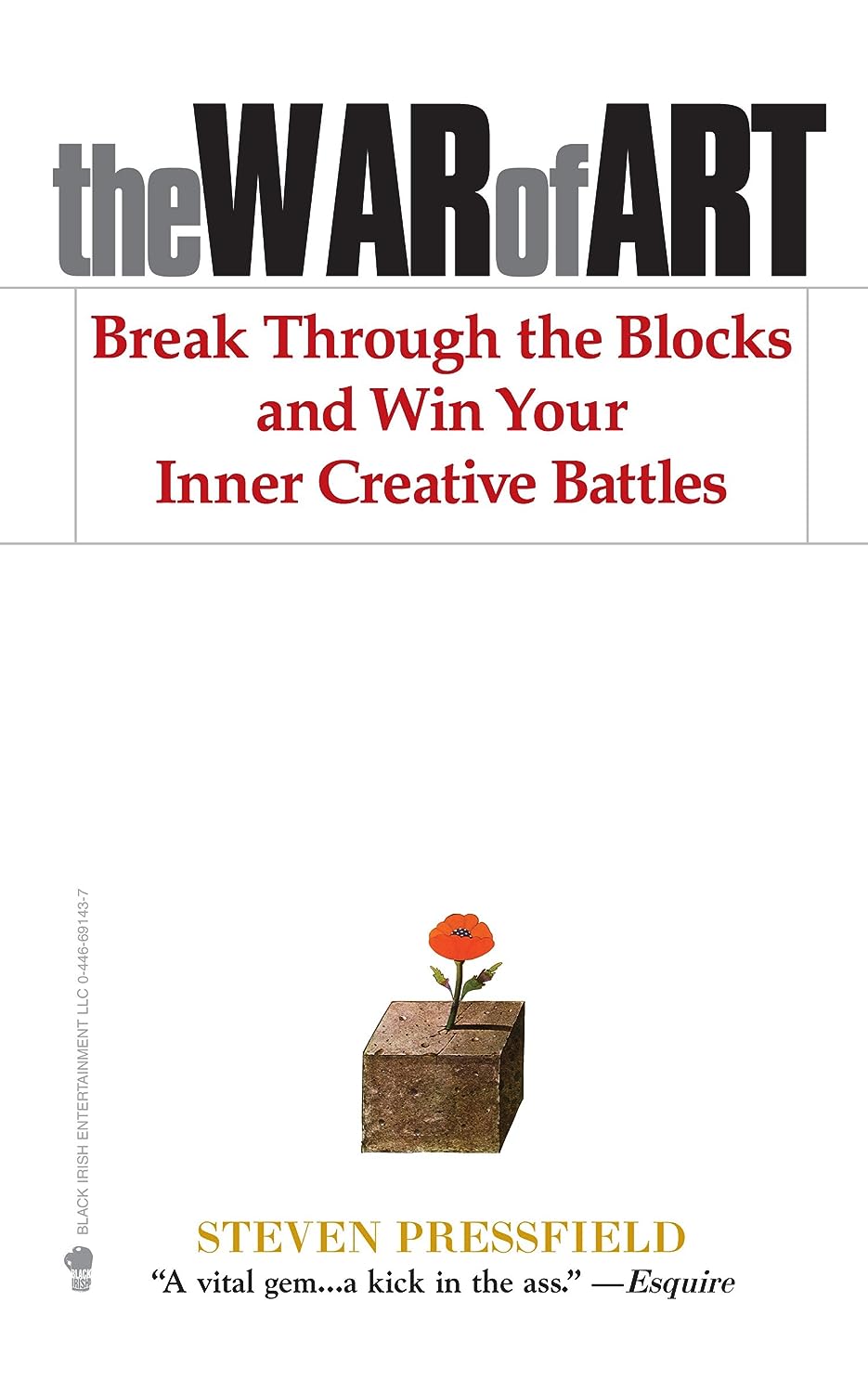The Importance of Discipline and Self-Mastery
In "The War of Art," Steven Pressfield brings to light a powerful truth: the journey to success is paved with the bricks of discipline and self-mastery. Pressfield, with his insightful and direct prose, unravels how these twin pillars are not just helpful, but essential in overcoming the myriad of internal obstacles that hinder our progress, which he broadly categorizes as 'Resistance.'
"Self-knowledge, self-discipline, delayed gratification and hard work," Pressfield states, are the antidotes to the Resistance that often manifests in forms of procrastination, distractions, and various self-sabotaging behaviors. In a world that's constantly offering quick fixes and instant gratification, the author reminds us that the path to realizing our true potential is often less traveled, marked by the rigors of discipline and the pursuit of self-mastery.
Pressfield doesn't just theorize these concepts; he embodies them. He shares his personal journey of transformation, from a phase of limited self-discipline in his youth to a period of rigorous self-mastery that paved the way for his success as a writer. This transformation was not an overnight miracle but a result of consistent effort, a testament to the idea that discipline is cultivated, not inherited.
The book’s narrative is strewn with powerful nuggets of wisdom that reinforce this concept. One striking quote goes, “The only solution to overcoming this ‘brainwashing’ is the development of self-discipline.” This line serves as a clarion call, urging us to rise above the passive consumption patterns that our culture often endorses.
Through the lens of Pressfield's experiences and insights, we are invited to look inward and recognize that the greatest battles we face in achieving our goals are often within ourselves. This revelation is not meant to intimidate, but to empower. Knowing that the key to unlocking our potential lies within our own capacity for discipline and self-control is both liberating and motivating.
Understanding and Overcoming Resistance
In "The War of Art," Steven Pressfield introduces us to a formidable enemy that each of us faces, especially when we strive towards creativity and personal growth. This adversary, which Pressfield names 'Resistance', is a force lurking within us, manifesting as procrastination, self-doubt, fear, and a myriad of other internal obstacles. It's a clever, intangible presence that repels us from our true potential and greatest achievements.
Pressfield masterfully unravels the nature of this inner foe. He explains, "Resistance is not a peripheral opponent. Resistance arises from within. It is self-generated and self-perpetuated. Resistance is the enemy within." This insight is a call to arms, reminding us that the struggle against Resistance is fought on the battleground of our own minds.
The beauty of Pressfield's approach lies in his candid acknowledgment of Resistance's power. He doesn't minimize the challenge; instead, he prepares us for a realistic fight. By recognizing and understanding Resistance, we arm ourselves against its devious tactics. Resistance, as Pressfield points out, "is the most toxic force on the planet. It is the root of more unhappiness than poverty, disease, and erectile dysfunction."
However, it's not all about the grim battle. Pressfield also offers a beacon of hope. He suggests that the very presence of Resistance is an indication of our potential, our capacity to achieve greatness. Every time we encounter Resistance, it signifies that we are on the right path, pushing against the barriers of what we once thought impossible.
To overcome this adversary, Pressfield doesn't offer a one-size-fits-all solution. Instead, he advocates for a personal revolution - a disciplined, committed, and persistent approach to our endeavors. Whether we are artists, entrepreneurs, or anyone aiming to break through personal barriers, understanding and mastering Resistance is key to unleashing our true potential.
The Professional versus Amateur Mindset
In "The War of Art," Steven Pressfield draws a compelling distinction between professionals and amateurs in their approach to creative work. This contrast is not about earning money or fame, but rather about attitude, discipline, and commitment.
Pressfield asserts that professionals treat their work with a level of seriousness that goes beyond mere enthusiasm or passion. He writes, "Turning pro is like kicking a drug habit or stopping drinking. It's a decision, a decision to which we must re-commit every day." Professionals show up every day, regardless of their feelings, and do the work. They understand that creativity is not just about inspiration but also about perseverance and grit.
In contrast, amateurs allow their emotions and circumstances to dictate their productivity. They work only when it feels right or when inspiration strikes, often leading to inconsistency and unfulfilled potential. Pressfield poignantly states, "The amateur plays for fun. The professional plays for keeps."
Furthermore, professionals are not deterred by rejection or criticism; they see these as part of the process and opportunities for growth. They detach themselves from the outcome, focusing instead on the work itself. Pressfield notes, "The professional loves her work. She is invested in it wholeheartedly but does not forget that the work is not her." This detachment allows professionals to handle feedback and setbacks in a way that fuels their growth rather than hinders it.
This mindset of the professional, as depicted by Pressfield, is an essential ingredient for anyone aspiring to overcome internal barriers and achieve significant creative success. It's about embracing discipline, resilience, and a commitment to the craft, regardless of external validation or immediate results. This mindset transforms the way one approaches not just art but life itself.
The Psychological Battle of Creative Work
Diving into "The War of Art" by Steven Pressfield, we encounter an exploration of the internal struggles that creatives face. It's about the unseen, often unspoken fight that takes place in the mind of every artist, writer, and creator. This isn't just about finding inspiration or battling writer's block; it's a deep dive into the psyche of a creative individual.
Pressfield introduces us to 'Resistance', a force that's both insidious and universal. "Resistance will tell you anything to keep you from doing your work," he writes. It's not just a fleeting feeling of discomfort or a temporary lack of motivation; Resistance is a formidable enemy dwelling within, constantly working to prevent us from achieving our creative potential.
But why does this battle matter so much? Because it's about more than just creating art. It's about realizing our true selves and our highest aspirations. When we give in to Resistance, we're not just avoiding a day's work; we're denying a part of our very essence. As Pressfield puts it, “Our job in this lifetime is not to shape ourselves into some ideal we imagine we ought to be, but to find out who we already are and become it.”
This struggle is relentless. Pressfield doesn’t sugarcoat the reality of the creative journey. It's filled with self-doubt, fear, and a constant need to push against the ever-present force of Resistance. But it's also the most rewarding battle one can undertake. Every day you sit down to create, you’re not just working on your art; you're engaging in a profound act of self-discovery and defiance against the internal forces that seek to silence your voice.
What makes this journey worth undertaking is the realization that on the other side of Resistance lies the true expression of our creativity and identity. As Pressfield eloquently states, “If you find yourself asking yourself (and your friends), 'Am I really a writer? Am I really an artist?' chances are you are.” The very act of questioning and struggling against Resistance is a testament to the creative spirit that resides within.
The message is clear: Embrace the battle, for it is in this struggle that we find the essence of our creative selves. It's a call to arms for every artist to recognize the enemy within and to valiantly face it, day after day. Through this continuous fight, we not only create art, but we also forge ourselves.
The Role of Fear and Ego in Resistance
In "The War of Art," Steven Pressfield sheds light on an intriguing aspect of the creative process – the intertwined roles of fear and ego. These elements emerge as silent adversaries, often lurking beneath the surface of our conscious struggles.
Pressfield masterfully illustrates how fear is not just an emotion; it is a cunning barrier, a form of Resistance that halts us from realizing our full potential. Fear whispers tales of doubt and inadequacy, telling us we are not good enough, not ready, or that the timing isn't right. It's a relentless voice, subtly undermining our confidence and will to create. Pressfield puts it succinctly: "Fear is the root of all Resistance."
Ego, on the other hand, plays a contrasting yet complementary role. It steps in masquerading as our protector, shielding us from potential failure and embarrassment. However, this protection is a double-edged sword. It keeps us cocooned in a comfort zone, where growth and creativity are stifled. Ego feeds on complacency and familiarity, steering us away from the unknown terrains where true art is born.
The relationship between fear and ego is a delicate dance of self-sabotage. While fear immobilizes, ego offers a false sense of security. Pressfield brings this to life with the piercing insight: "The ego doesn’t want us to complete our work. It prefers that we define ourselves by our intention to work, not our real work."
What "The War of Art" offers is not just an exposition of these internal battles but also a guide to acknowledging and overcoming them. The journey towards creative liberation is not about vanquishing these forces but understanding their nuances and navigating through them with perseverance and self-awareness.
The Role of Fulfilling One's Creative Destiny
In "The War of Art," Steven Pressfield presents a compelling call to action for all of us to embrace our unique talents and pursue our creative destinies. At the heart of this inspirational journey is the belief that each person is endowed with a distinct set of gifts, a unique voice that yearns to be expressed and shared with the world.
Pressfield masterfully argues that realizing our creative potential is not just a personal accomplishment, but a vital act of contribution to the larger tapestry of humanity. "Our job in this lifetime is not to shape ourselves into some ideal we imagine we ought to be, but to find out who we already are and become it," he writes. This powerful statement encapsulates the essence of what it means to fulfill one's creative destiny – it's a process of uncovering and nurturing one's inherent talents, rather than conforming to external expectations.
The journey to fulfilling one's creative destiny, as Pressfield illustrates, is often riddled with challenges and obstacles. The most formidable of these is Resistance, a force that manifests in various forms such as fear, doubt, and procrastination, constantly attempting to veer us away from our path. However, Pressfield encourages us to view these challenges not as barriers, but as indicators that we are moving in the right direction, towards something truly meaningful and important.
Fulfilling one's creative destiny also involves a deep understanding of one's true self. Pressfield emphasizes the importance of self-reflection and honesty in this pursuit. He reminds us that this journey is uniquely our own, and the success of it lies in staying true to our inner voice and vision. "The artist committing himself to his calling has volunteered for hell, whether he knows it or not," Pressfield asserts, highlighting the courage and resilience required in this endeavor.
Ultimately, "The War of Art" isn't just a book about creativity; it's a beacon of motivation, urging us to step up and heed the call of our inner artist. By doing so, we not only fulfill our own destinies but also inspire those around us to embark on their own journeys of self-discovery and creative expression. As Pressfield beautifully puts it, "If you were meant to cure cancer or write a symphony or crack cold fusion and you don’t do it, you not only hurt yourself, even destroy yourself. You hurt your children. You hurt me. You hurt the planet."

